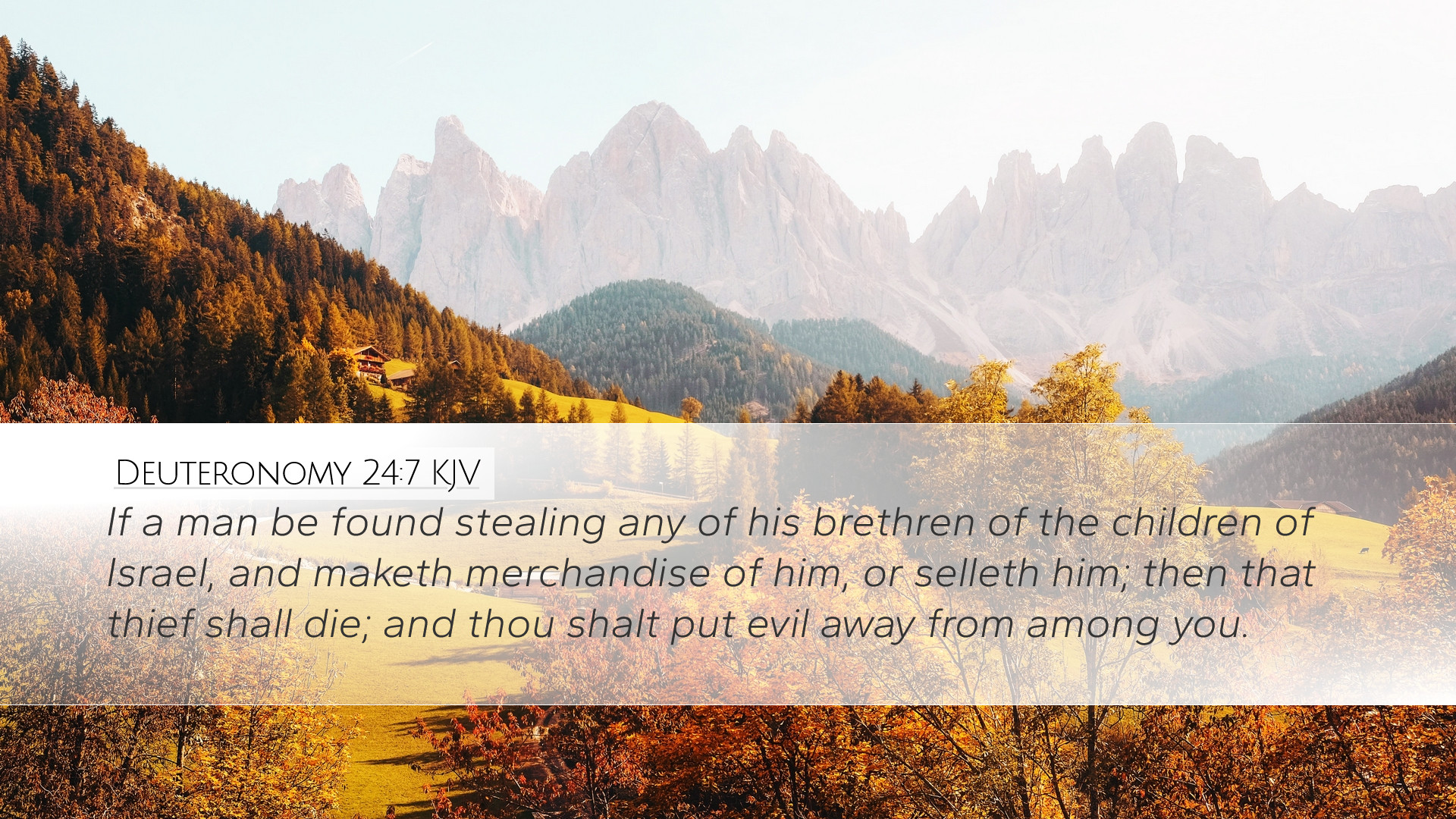Commentary on Deuteronomy 24:7
Bible Verse: "If a man is found stealing one of his brothers of the children of Israel and mistreats him or sells him, then that thief shall die; so you shall put away the evil from among you."
Introduction
The passage in Deuteronomy 24:7 addresses the serious crime of theft, particularly in the context of the Israelite community. This verse highlights the moral and social implications of stealing a fellow Israelite and the strict penalties that govern such actions. Commentators have provided valuable insights into the significance of this verse within the framework of the law and the intent behind these commandments.
Historical and Cultural Context
Understanding the historical backdrop of ancient Israel is critical for interpreting this verse. The Israelites, having just emerged from slavery in Egypt, were forming a societal structure that required guidelines to foster community integrity and spiritual righteousness. Theft not only represented a breach of trust but also threatened the fabric of the community.
- Matthew Henry's View: Henry emphasizes the importance of maintaining social order among God's people. He notes that theft disrupts the unity and mutual dependency of the community. Within this context, the penalty serves to deter individuals from dishonoring their brothers and violating God's law.
- Albert Barnes' Insight: Barnes discusses how the law reflects God's concern for justice and fairness. The law aimed to protect the underprivileged and ensure that no one would be treated as a mere commodity. The severity of the punishment underscores the gravity of stealing from a fellow Israelite and the need to uphold communal righteousness.
- Adam Clarke's Commentary: Clarke elaborates on the social implications of theft. He points out that the trafficking of a fellow Israelite not only represents a crime against an individual but also against the nation as a whole. In hurting one, the thief injures his community, warranting a severe response.
Theological Significance
This verse presents a multifaceted theological perspective on justice, mercy, and community. The Israelite laws were rooted in a covenant relationship with God, emphasizing the moral obligation to care for one another.
- Moral Responsibility: The laws outlined in Deuteronomy, including 24:7, illustrate God's expectations of His people to live in harmony and protect each other's dignity.
- Divine Justice: The notion of justice prevalent in the Old Testament often operates on the principle that breaches of the law lead to collective moral decay. The death penalty for theft signifies a call for serious contemplation concerning the sanctity of life and community.
- Social Justice: The punishment is not merely punitive but aims to establish a societal norm where the rights of individuals, especially the vulnerable, are safeguarded.
Application for Today's Believers
While the direct application of such civil laws may differ in today's context, the principles of justice, community responsibility, and personal integrity remain relevant.
- Emphasis on Integrity: Believers today are called to uphold integrity in their dealings, ensuring that they do not exploit or harm others for personal gain.
- The Need for Accountability: Just as the Israelites were accountable for their social conduct, modern Christians are called to hold one another accountable within their communities.
- Protecting the Vulnerable: Christians are reminded of the importance of looking out for the underprivileged and marginalized in society, advocating for their rights and dignity.
Conclusion
Deuteronomy 24:7 serves as a timeless reminder of the seriousness of sin and the communal nature of our responsibilities towards one another. Through the insights of Matthew Henry, Albert Barnes, and Adam Clarke, we gain a deeper understanding of the verse's implications within the broader narrative of Scripture. As we reflect on these teachings, may we strive for a community built on justice, love, and mutual respect, following the principles laid down in God's word.


